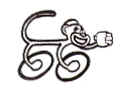MONDAY, SEPTEMBER
11, 2000
spokes-
persons

I suppose no matter what you do for a
living, you are forced to accept that certain colleagues
will, for good or ill, somehow come to represent your
vocation in the mindís eyes of the general public. All
airline pilots are forced to imitate Chuck Yaegerís
Texan drawl; all computer geeks channel microbits of
Gates, Wozniak, and Jobs; and all lawyers are tainted by
the brush dipped in the oily mixture of superstar
lawyers like Mel Belli, F. Lee Bailey, and Johnnie
Cochran. It is, nevertheless, annoying and ironic when
bike messengers who have a vain self-image as the last
of the rugged individualists cannot make a new friend or
go to a party without being asked, upon disclosing our
careers, "Oh, you mean likeÖ Ďthat guy.í"
When I started messengering in San
Francisco, late in 1979, "that guy" was a
fellow with the charmingly unsexy nickname,
"Crud." To his credit, Crud was the real
thing. Crud, a good-looking, healthy long-hair with a
wolfy smile, wore a cap with a propeller, switched back
and forth from streets to sidewalks at will, and
perfected a howling scream which echoed throughout the
canyons of the financial district. To this day, over
twenty years later, some vestiges of Crudís sounds and
couture still appear among the messenger hordes.
After Crud disappeared, his place was
taken by a talented, stage-hungry musician named Marcus.
Marcus was visible, articulate, charismatic, and
ambitious. He wasnít, Iím sorry to say, that much of
a messenger since he was often injured, notoriously
lazy, and quite preoccupied with rehearsing and
publicizing his string of bands. Marcus had the
attention and phone numbers of local media types like
Herb Caen who could always use a bit of messenger color
on a slow news day. Marcus, almost single-handedly,
created the after-work messenger scene and by doing so
guaranteed constant audiences and venues for his musical
pursuits. The scene flourishes to this day as more and
more bars figure out a messenger-friendly gig attracts
thirsty patrons. If that wasnít enough, Marcus also
founded and produced a ízine called "Mercury
Rising," which declared to the world at large that
we had a happening sub-culture. The more he trumpeted
our secrets, the more we could count on reading about
ourselves in the mainstream dailies and weeklies of this
town. Yippee, no? Marcus died young, the victim of an
overdose. Not long after his death, the SF Weekly ran a
cover story about him, his bands, and his life as a
messenger. Death is a great career move in any field.
And then there was Puck. Oy. Puck was
a messenger for milliseconds but set new records for
"that guy." Puck got picked for the very
popular MTV show "The Real World" and soon
become a minor international star. I could explain my
job anywhere on the globe now, from Los Angeles to
Lisbon, and expect the same response: "Oh, like
Puck?" Puckís contribution to the image of
messengers as smelly, drug-addled, psychotic sociopaths
made good old Crud seem like Martha Stewart.
Our leader nowadays, in the eyes of
the SF public, is just that, a leader. Howie is a
brilliant, diverse, soft-spoken, intelligent individual
who should have been born in time for the epic union
struggles of the early twentieth century. Hell, Howie
should have been at Leninís side in 1917. Howie, like
Marcus, is media-savvy. Year after year he leads the
efforts to unionize messengers, form associations and
old-fashioned guilds, and generally make a bunch of
itinerant, anarchistic bikers act like shriners on
parade. Donít get me wrong, I admire and love the guy.
But do we really need a party leader when we are all
party leaders at heart?
I once told a bartender downtown that
I didnít like the messenger movie
"Quicksilver" because I wished that Mickey
Rourke or Matt Dillon had played the lead. "No
way," she said and looked deep into my eyes.
"Matt Dillon is way too cute to play a bike
messenger." So much for popular images of bike
messengers that day!
Steel Monkey
(bjksf@wenet.net